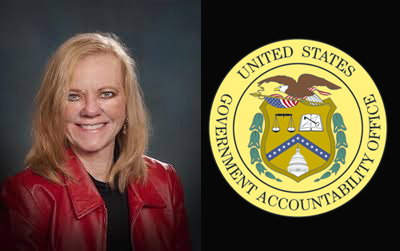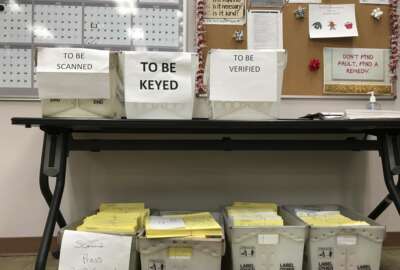
Senators want to block Trump’s hopes of privatizing the Postal Service
In today's Federal Newscast, 28 Senators signed on to a resolution to keep the U.S. Postal Service a federal entity.
To listen to the Federal Newscast on your phone or mobile device, subscribe on PodcastOne or Apple Podcasts. The best listening experience on desktop can be found using Chrome, Firefox or Safari.
- A Senate resolution would slam the door on the Trump administration’s hopes for privatizing the U.S. Postal Service. Even though USPS loses billions of dollars a year, at least 28 senators signed a resolution to keep it a federal entity. The bill was introduced by Missouri Democrat Claire McCaskill, ranking member of the Homeland Security and Governmentmental Affairs committee. The bill text claims privatization would result in higher prices and reduced mail service in rural areas. (Congress.gov)
- The former head of the US Marshals Service violated federal ethics, the Justice Department’s Office of the Inspector General found. Stacia Hylton violated conduct standards by recommending an applicant for a contractor job at the agency. The report also found fault with former Deputy Assistant Director of the Asset Forfeiture Division Kimberly Beal. The OIG said Beal manipulated the hiring process to benefit the applicant. This all comes after Sen. Chuck Grassley (R-Iowa) sent a letter to DOJ detailing tips from whistleblowers. (Department of Justice Office of Inspector General)
- Dwane Nevins, a small business specialist at Veterans Affairs’ Contracting Office in Colorado, was arrested for allegedly taking bribes to rig the federal contracting process. The Justice Department said Nevins also attempted to extort $10,000 from an FBI agent posing as an owner of a service-disabled veteran owned small business. (Department of Justice)
- A dispute between a federal union and the Veterans Affairs Department continues in at least one medical center. AFGE’s chapter in Missouri sued VA over Trump administration executive orders on official time and employee performance. Parts of them were invalidated by a federal district court earlier this month. But employees at the Harry S. Truman medical center in Columbia claim their management failed to walk back the orders. They filed their case in the same D.C. district court that ruled against the administration. (Federal News Radio)
- Reps. Jody Hice (R-Ga.) and Mark Meadows (R-N.C.) introduced a bill to give the Office of Management and Budget the authority it needs to begin its proposed government reorganization. The Reforming Government Act is a companion to an earlier version that Homeland Security and Governmental Affairs Committee Chairman Ron Johnson (R-Wis.) and Subcommittee Chairman James Lankford (R-Okla.) introduced earlier this summer. The Senate committee is expected to consider that bill next week. (Federal News Radio)
- Google has warned several senators and staff members that foreign governments are trying to break into their personal email accounts. At least one lawmaker believes it’s the Senate’s job to stop them. Sen. Ron Wyden (D-Ore.) said the office of the Senate Sergeant at Arms should offer cybersecurity protections for Senate employees’ private email accounts, just as it does for senate.gov addresses, and he’s offered legislation that would require it to do so. Thursday, Google confirmed that it’s detected attempts by what it thinks is a nation state to hack into Senate employees’ Gmail accounts. One Senate staffer told the AP the attacks happened within the last few weeks or months. (Federal News Radio)
- After 15 years, the White House updates the national cybersecurity strategy. The Trump administration rescinded an Obama-era directive on conducting offensive cyber operations and told nation states, adversaries and criminals that the gloves are off. National Security adviser John Bolton announced the changes Thursday as part the release of the new national cybersecurity strategy. Bolton said the decision to go on the offensive, when needed, is not because the government wants to attack bad actors, but to deter adversaries so the cost of engaging in operations against the nation is higher than the hackers want to bear. (White House)
- Two top technology executives at the Securities and Exchange Commission are leaving. SEC Chief Information Officer Pam Dyson will become executive vice president and CIO for the Federal Reserve Bank of New York. Meanwhile, the SEC said Christopher Hetner, the senior adviser to Chairman Jay Clayton for Cybersecurity Policy, plans on leaving in the coming months. Charles Riddle, the SEC’s chief technology officer, will be acting CIO until a permanent one is named.
- Federal retirees can now donate to this year’s Combined Federal Campaign through its online portal. Last year marked the first time retirees could donate. But a legal snag under the Paperwork Reduction Act caused delays. The Washington metro area’s CFC campaign looks to raise $38 million between now and Jan. 11. (Federal News Radio)
Copyright © 2025 Federal News Network. All rights reserved. This website is not intended for users located within the European Economic Area.
Eric White
Eric White is news anchor and Federal Drive producer at Federal News Network.
Follow @FEDERALNEWSCAST
Related Stories
Related Topics
Agency Oversight
All News
American Federation of Government Employees
CIO News
Combined Federal Campaign
Congress
Cybersecurity
Donald Trump
Federal Drive
Federal Newscast
Google
Management
Marshals Service
People
Postal Service
privatization
Reforming Government Act
Senate
Technology
Unions
Veterans Affairs
Workforce





